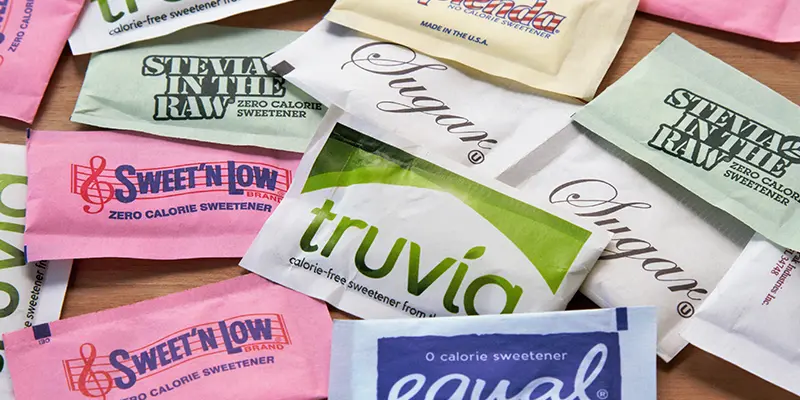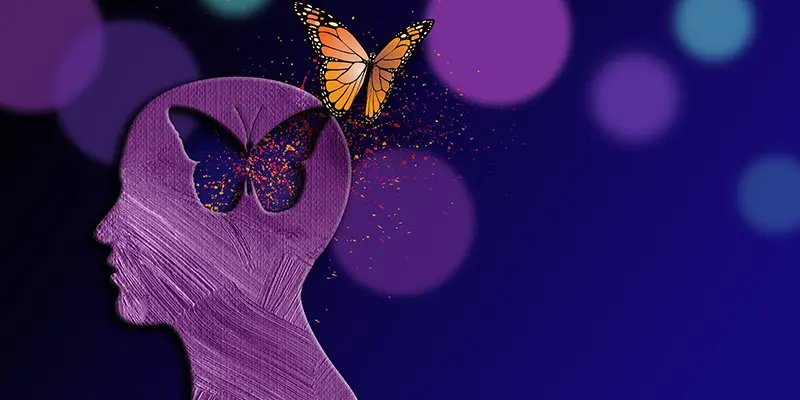
Americans have a love affair with sweets. Too many of us are hooked on foods and drinks that are filled with sugar or artificial sweeteners. Decades of research show that this is a toxic relationship, as sugar and artificial sugar substitutes have a negative impact on cognitive function, mental health, and memory. In spite of the consequences, it can be challenging to give up the sweet stuff. There is good news for people who have a sweet tooth—a 2022 study in Nutritional Neuroscience shows that a natural sweetener, stevia, is a better choice.
Sugar and artificial sweeteners have a negative impact on cognitive function, mental health, and memory. A 2022 study shows that a natural sweetener, stevia, is a better choice.
HOW SUGAR IMPACTS MEMORY AND COGNITIVE FUNCTION
Each year on average, Americans consume approximately 140 pounds of sugar. Refined sugar is 99% pure calories, and it is void of any nutrients. Eating the sweet stuff causes blood sugar levels to spike, which triggers the release of insulin. Soon after, blood sugar levels drop, which causes cravings for a sweet treat. It causes a rollercoaster effect that keeps you hooked on sugar the same way a drug addict craves addictive substances.
Refined sugar wreaks havoc on the brain and body. It increases inflammation and erratic brain cell firing. Consuming sugar has also been associated with depression, ADD/ADHD, and a decline in cognitive ability. In brain imaging studies, sugar increases “slow brain waves,” and a study at UCLA showed that sugar alters memory and learning.
In the 2022 study published in Nutritional Neuroscience mentioned earlier, researchers evaluated the impacts of frequent consumption of sucrose (sugar), the artificial sweetener sucralose (Splenda), or the natural sweetener stevia on the central nervous system. For this randomized controlled trial, participants eliminated all sweeteners for a 1-week period and then underwent neuropsychological assessments as well as EEG/qEEG analysis. A qEEG is a diagnostic tool that measures electrical activity in the brain in the form of brain waves. Then the participants were randomized into 3 groups and consumed one type of sweetener for 6 weeks. After the 6-week period, they were re-tested. The results showed that sugar was associated with a negative impact on encoding memory (learning).
HOW ARTIFICIAL SWEETENERS AFFECT MEMORY
Consuming artificial sweeteners—such as aspartame (NutraSweet, Equal), saccharine (Sweet’N Low), or sucralose (Splenda)—on a regular basis is not a recipe for good health. It can contribute to chronically high insulin, which increases your risk for Alzheimer’s disease and raises the risk of heart disease, diabetes, metabolic syndrome, and other health problems.
A wealth of research has shown an association between artificial sweeteners, such as aspartame, and cognitive and behavioral problems, including anxiety, depression, irritability, and sleep troubles. A 2018 study in Nutritional Neuroscience concluded that “aspartame may be responsible for adverse neurobehavioral health outcomes.”
Earlier findings from a 2017 study in the journal Stroke concluded that drinking artificially sweetened sodas are associated with an increased risk of dementia, as well as stroke. Just one can of an artificially sweetened beverage per day makes you 3 times more likely to develop dementia or suffer a stroke, according to the study.
In the 2022 study that looked at sugar, sucralose, and stevia, the results found that sucralose (Splenda) had a negative impact on overall memory, encoding memory, and executive functions (judgment).
THE NATURAL SWEETENER STEVIA HAS NO NEUROPSYCHOLOGICAL IMPACT
Unlike artificial sweeteners, stevia is a natural sugar substitute. Extracted from the leaf of an herb, stevia is 200-300 times sweeter than sugar, however, it has no impact on blood sugar levels. Some scientific evidence suggests that stevia may stabilize blood sugar levels, enhance glucose tolerance, and reduce blood pressure, but more research is needed.
The 2022 study found that stevia is a neutral sweetener, as there were no significant differences in the before-and-after neuropsychological or qEEG testing results. Sugar and sucralose both increased daydreaming brain waves on qEEG, while stevia had no effect.
When looking for a sweetener that doesn’t harm the brain or body, stevia appears to be the better choice. Note: Consult with a healthcare provider before using stevia if you take medication for blood pressure or diabetes.
Memory problems and other mental health issues can’t wait. At Amen Clinics, we’re here for you. We offer in-clinic brain scanning and appointments, as well as mental telehealth, clinical evaluations, and therapy for adults, teens, children, and couples. Find out more by speaking to a specialist today at 888-288-9834 or visit our contact page here.





Good information as so many adults are ingesting sugar substitutes believing that they are making a healthier choice.
Comment by S. Fleming — October 19, 2022 @ 3:32 AM
Can you comment on Monkfruit? I do not like Stevia. Thank you Dr. Amen.
Comment by Michelle — October 19, 2022 @ 3:35 AM
Is honey bad for the brain?
Comment by Rosa — October 19, 2022 @ 4:15 AM
Is there a study with Monk Fruit.? The aftertaste of Stevia is bitter to some.
Comment by Diana Russell — October 19, 2022 @ 4:34 AM
Wish I lived in America😔
Comment by Karen panton — October 19, 2022 @ 4:44 AM
I get a Stevia headache. What are your thoughts on 100% Monk Fruit?
Comment by Kim — October 19, 2022 @ 4:44 AM
I have tried stevia in the past. It has a slightly bitter aftertaste and coats the back of my tongue. After consuming, it caused brain fog and tiredness almost like when taking an antihistamine. What would cause this?
Comment by Niki — October 19, 2022 @ 5:43 AM
What about Maple syrup
Comment by Steve Dolbow — October 19, 2022 @ 5:49 AM
My problem with Stevia is that it is related to the ragweed family, and I am allergic. I have one packet of Splenda each day with my unflavored bone broth, but do not notice any memory decline, my blood glucose is great, I don't take any medications at 74 yrs of age, and weigh 104.8 lbs on most days depending on my caloric/water intake the previous day. I also do not eat any pastries, pasta, candies or any sugars except in fruits. I am also a research subject for Mayo Clinic in dementia and have been for 23 yrs. I am in the control group.
Comment by Mrs. Ferris S.Whitfield — October 19, 2022 @ 5:52 AM
What about monk fruit?
Comment by Ruth Allen — October 19, 2022 @ 5:58 AM
What about Monk Fruit? Is that a safe sugar substitute?
Comment by Julie — October 19, 2022 @ 6:05 AM
Is Monk Fruit a safe sweetener to use?
Comment by Julie — October 19, 2022 @ 6:13 AM
How about monkfruit?
Comment by Dawn — October 19, 2022 @ 6:23 AM
Sounds like stevia may be the best choice but what do you do when it causes headaches? (this is what happens every time I have stevia)
Comment by sarah — October 19, 2022 @ 6:27 AM
Are there any studies on the natural monk fruit sweetener or erythritol (sugar alcohol) which are gaining popularity? Thank you!
Comment by Sarah — October 19, 2022 @ 6:30 AM
What about Monkfruit?
Comment by Deirdre — October 19, 2022 @ 7:44 AM
I wonder if other natural sweeteners, like monk fruit, would work like stevia.
Comment by Susan W — October 19, 2022 @ 8:10 AM
I, like many of my friends, cannot stand the taste if Stevia, especially the aftertaste. This is why I cannot buy any of your supplements that have stevia in then. Monk fruit sweetener is slightly better.
Comment by Ellen Ewing — October 19, 2022 @ 9:11 AM
Thanks! What about Xylitol? I have read that it can help with bacteria , etc. in tooth paste, mouthwash, and more.
Also – what's the problem with Stevia and HBP meds?
Comment by Carolyn — October 19, 2022 @ 9:40 AM
Have there been studies regarding allulose and neurological impact?
Comment by Fran smith — October 19, 2022 @ 10:23 AM
GHi. What products are Stevia found in? Thanks, Jim
Comment by Jim Wright — October 19, 2022 @ 3:18 PM
Where does Honey fit into this equation? I know its not artificial but it must alter the blood sugar level and how bad is it? And now there is Monkfruit sweetener. It claims to NOT alter the blood sugar level. Please advise as I use both. Thanks!
Comment by Chrissy Rotermund — October 20, 2022 @ 6:20 AM
I did not read in this article or the 2022 study where this is reversible. Can the impact of artificial sweeteners on memory be reversed? Thank you.
Comment by Michelle — October 20, 2022 @ 8:18 AM
Stevia in the Raw contains dextrose and causes a blood glucose spike. Using liquid Stevia does not this spike. Better choice for diabetics
Comment by Christina — October 20, 2022 @ 9:08 AM
I’m curious if you have any information on monkfruit and/or erythritol? Thank you!
Comment by Susan Brueheim — October 20, 2022 @ 9:10 AM
Enjoyed this article. Did not know how much sugar effects our brain. But sugar and these artificial sweeteners are in everything. How do I get away from all these garbage foods. I’m a type 2 diabetic and it’s so hard to stay on course with eating healthy.
Comment by Russ DiCristofaro — October 21, 2022 @ 5:23 AM
What about honey? Is it harmful?
Comment by Ellen — October 21, 2022 @ 6:52 AM
Can you please add some commentary to this article answering the above questions regarding monkfruit, erythritol, xylitol? I use a whole earth product containing stevia leaf, monkfruit, erythritol and like it better than others but do battle occasional brain fog and memory issues, so wanting the safest sweetener I can find – I'm a coffee fiend. Thank you.
Comment by duncan honig — October 31, 2022 @ 4:11 AM
I do get a bitter aftertaste from stevia. I think the questions about are excellent. Are they answered somewhere?
Comment by Jean — January 18, 2023 @ 10:11 AM
Allusose is a natural sugar derived from the fig plant. It tastes just like cane sugar and it has powerful nutrients.
Comment by Jose Bayona — May 16, 2023 @ 2:58 AM
people at high risk of insulin resistance and obesity (>100 million Americans) /diabetes (>30 million) and MCI (~47 million) and /or Alzheimer's diseases (>7 million Americans).
stevia leaf, monk fruit, erythritol – which is the best one for gut microbiota and brain connect ion?
Comment by Naresh — May 16, 2023 @ 10:08 AM
wonderful information!
Comment by Doug Morris — August 24, 2023 @ 1:51 PM
You should discuss monk fruit affect on the brain!
Comment by Osnat — August 24, 2023 @ 10:17 PM